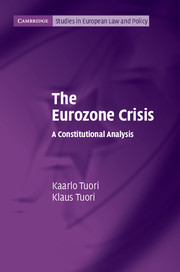1 - Introduction
Framework of the analysis
Published online by Cambridge University Press: 05 June 2014
Summary
The Eurozone crisis possesses many aspects. Most conspicuously, it has manifested itself as an economic, financial and fiscal crisis; as increasing unemployment and laggard economic growth; as bottlenecks in the financial system as well as liquidity and solvency problems of financial institutions; and as mounting public debt and threatening state insolvency. But at issue is also a constitutional crisis. The crisis has shaken the foundations of what we shall term the second, macroeconomic layer of the European economic constitution. The Maastricht principles of the European economic constitution are teetering, with implications reaching out beyond the economic dimension and extending to the national level, too. A constitutional analysis of the crisis must adopt a broad perspective and a comprehensive analytical framework.
Our discussion of the constitutional implications of the Eurozone crisis is based on a specific understanding of what constitutions in general and the European constitution in particular are about. In the nation-state context, especially in the revolutionary French and American traditions, constitutions are seen as unified normative entities which result from the exercise of constituent power – pouvoir constituant – by the people – the demos – at a clearly definable constitutional moment. This tripartite conceptual apparatus – ‘constituent power’ – ‘demos’ – ‘constitutional moment’ – is not applicable to the European constitution: there is no unified European constitution to which the European citizenry would have given birth as an expression of its constituent power at a particular constitutional moment. When discussing the European constitution, revolutionary constitutional concepts must be replaced by an evolutionary counterpart; namely constitutionalisation. Characteristic of the European constitution is its process-like nature; it is not a temporarily and substantively clear-cut normative entity but, rather, a continuous process of constitutionalisation.
- Type
- Chapter
- Information
- The Eurozone CrisisA Constitutional Analysis, pp. 3 - 12Publisher: Cambridge University PressPrint publication year: 2014



